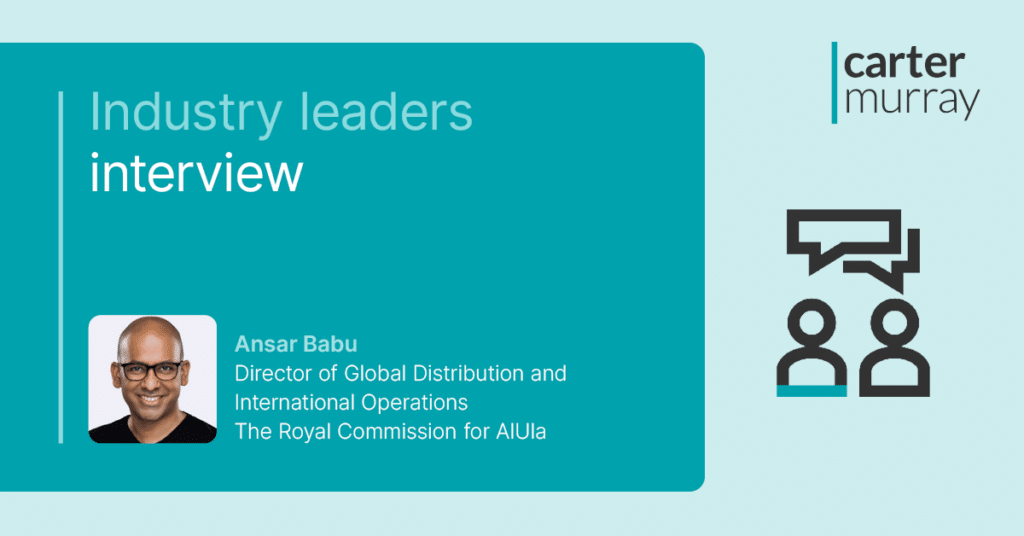Interview with Ansar Babu: putting AlUla, an ancient city of innovation and possibilities on the map
At Carter Murray, we support sales professionals across the globe and the full marketing spectrum.
Our own Olivia Roberts is a specialist in executive search and directs our B2C sector in the Middle East region.
In her latest industry leaders’ interview, Olivia sat down with Ansar Babu, Director of Global Distribution and International Operations at The Royal Commission for AlUla

Can you tell us about your previous experience in global distribution and destination marketing? How has it prepared you for a role with The Royal Commission of AlUla?
Prior to joining The Royal Commission for AlUla (RCU), I worked in aviation, travel and tourism within the marketing space for twenty years. This is an industry challenged with low margins due to which marketing tends to lean towards performance-driven ROI initiatives. Having worked closely with the commercial team across sales, distribution and e-commerce, my own skillset evolved around driving profitability as much as positioning, building narratives, and visuals. So, when the opportunity at RCU came up – it was a nice meeting point.
In my previous role at Etihad Airways, I looked after our international offices supporting the sales team from a marketing perspective. Similarly, in my current role at RCU, I lead our international offices who work closely with luxury tour operators to build awareness and drive visitation to the destination.
Another point of similarity is the perishable nature of inventory. Our AlUla Moments festivals run across the year and my team leads the sales of the various activations and events focusing on maximizing occupancy. This is very similar to the adrenaline rush of improving load factors on flights.
Indeed, there’s a lot of likeness even though both are different industries. As I was keen to venture outside of aviation, transitioning to this role has been ideal for me as I could hit the ground running.
How do you stay up to date with the latest trends and developments in global destination marketing? Can you provide an example of how you have applied this knowledge to your current role?
In a post-COVID world, so much has changed with how people look at travel. There are more people interested in travelling for exclusive experiences. You also have those looking to go to places less explored in the past. Or those who want more meaningful engagement with the local community. All these different personas fit well with our destination.
At AlUla, we see ourselves as game changers – we are blessed with the chance to change outdated perceptions about the region. Some of our treasured assets come from eras dating back over three thousand years and are largely unexplored. For me, getting our trade partners to reflect AlUla as a place of introspection, engagement and momentous connections though their products are key.
Otherwise, my objective since I joined The Royal Commission was to get the basics right. This was by firstly making sure we’ve got our trade partnerships in place, our accessibility in place and ensuring hotels and DMCs are geared up to international visitors. It’s not merely about innovation but also preparation.
AlUla has a rich cultural heritage and historical significance. How do you promote and leverage these unique aspects to enhance the destination’s marketing appeal?
Firstly, I’d like to emphasize that AlUla has much more to offer than purely its rich heritage and historical sites. Our destination is focused on six key pillars – heritage, nature and sustainability, arts and culture, adventure, wellness and hospitality. As you can see, the first two pillars are related to what we have been blessed with – the heritage sites, the breath-taking landscapes and oasis. The remaining four relate to how our organization has curated a comprehensive strategy to activate the destination to offer an experience that is unlike any other.
As Saudi Arabia only opened for tourism a few years back, and thanks to the great work done by the Saudi Tourism Authority and RCU, there’s already great interest across the world to know more and to visit. In 2022, the United Nations World Tourism Organization (UNWTO) recognised AlUla Old Town as one of the world’s Best Tourism Villages. Also, in January this year, Condé Nast Traveller named AlUla as one of the Seven Wonders of the World for 2023.
We still have a job to do to attract two million annual visitors by 2035. This is why we have developed the various pillars so that we appeal to various customer segments, as well as give them reasons to visit multiple times during the year.
In a highly competitive global tourism market, what innovative marketing techniques or campaigns are you implementing to position AlUla as a must-visit destination?
Launching a new destination today is an uphill task. Destination marketing is a very mature industry and visitors have access to a wide range of destinations, all well connected by land, sea and air. What works in AlUla’s favour is that we have the first mover advantage in what is possibly the most sought-after emerging inbound tourism market in the world today.
We don’t take this privilege lightly. Rather than sit back and let our heritage sites be the sole reason for visitors to land here, we’ve activated festivals and events which align with our brand pillars. We call this platform of activations as AlUla Moments – a set of experiences so extraordinary in a place so revitalizing that it’ll never leave your memory. These festivals run through the year making AlUla a place that is always exciting and more importantly, always relevant.
Alongside what happens in the destination, we also want to embrace innovation when it comes to the digital space – a recent initiative being the launch of the Hegra experience in the metaverse. You can marvel at the digital recreation of our heritage site not just from the ground, but also from a hot air balloon. Although this taps into a brand-new audience, our core focus remains – making sure that we’ve covered all our bases across brand marketing, PR, social and digital, and trade.
Building partnerships and collaborations are crucial for destination marketing. Can you share your experience in establishing and maintaining strategic alliances with international travel agencies, tour operators and other stakeholders?
This has been one of the biggest achievements of RCU to date. The credit really goes to our leadership and my predecessor, as these relationships were built and nurtured over the past three years. Our international representation agencies have done a stellar job in ensuring the top brass of luxury tour operators across our source markets are now selling AlUla.
When we began, some of those international tour operators were being exposed to Saudi Arabia for the first time. It wasn’t easy to get everyone’s attention initially as there was limited understanding of what the Kingdom had to offer as well as lack of knowledge about the local tourism ecosystem. Over the past three years, we’ve moved from the phase of attracting trade partners to now engaging with them to deepen their knowledge and experience in selling the destination.
My goal now is to build momentum and drive more conversion from these markets, aided by the infrastructural advancements achieved so far as well as the improved awareness across the world. Our key levers are tour operators selling varied types of itineraries featuring AlUla within their product portfolio as well as joint marketing initiatives run in markets to promote these itineraries.
As much as we are keen to promote ourselves there’s a bigger story in play here. We want travellers to experience Saudi Arabia as a whole and explore the complementary nature of each of its destination’s offerings. For this, we are working closely with Saudi Tourism Authority as well as all the giga projects who are expected to open soon, focusing on joint itineraries.
How are you approaching the challenge of attracting a diverse range of tourists, including different age groups, nationalities and travel preferences, to AlUla?
Our goal is to match the right audience with the right volume of visitors to the destination. For this we’ve done extensive research to identify the most valuable visitors, across each of our source markets.
Our three core segments – lux seekers, wanderlust nomads and intrepid voyagers – are at the crux of everything we do. These three groups appreciate the nature of our proposition, are keen to engage with our experiences and local community, and most importantly, are willing to pay the premium we charge.
Of course, there are variations when we deep dive into specific markets. Hence our central and regional teams all use this as the starting point when designing experiences or communications. It is a laser targeted approach focused on quality of visitors rather than quality – withholding our focus on responsible tourism and avoiding overcrowding of our precious assets.
The Royal Commission of AlUla aims to balance tourism development with the preservation of natural and cultural assets. How do you ensure sustainable tourism practices while promoting growth and economic benefits for the region?
Sustainability is a big topic around the world. It is an exceedingly important one in Saudi Arabia as a whole. The Kingdom has The Saudi Green Initiative that focuses on three things. The first is reducing emissions, the second is about protecting land and the third is about making it greener. We have a 12-point charter which then further breaks this down into much more detail. The tangible ones include ensuring net carbon neutral emissions by 2035, opting for more renewable energy across touchpoints, water management etc. A highlight feature will be a 46 km low-carbon tram that will connect the whole destination starting from the airport to our northernmost point in Hegra.
However, what I find more interesting is how we go beyond the physical environment and focus on social and financial sustainability – in making sure our resident population is empowered and making sure that they are employed within our tourism economy. For this purpose, we have trained several of our youth across schools, universities as well as vocational programs including culinary degrees.
Another aspect towards maintaining sustainability is how we are curating the landscape within the destination. You won’t see tall skyscrapers; everything is built quite low to not disturb the natural landscape. Plus, when pop-up events and festivals take place, we ensure the land is returned to its original state post-activation. After all, we are in a land that has witnessed continuous civilization for over 7,000 years. It is our responsibility to ensure we maintain its integrity for centuries to come.
We have no excuse to get this wrong as we are starting now. Everybody else has had hundreds of years of development and now is trying to backtrack. We’ve just started and hence we are holding ourselves to high standards to ensure we are seen as a forerunner in how responsible tourism can be managed. That is our ethos for the twelve-point charter.



